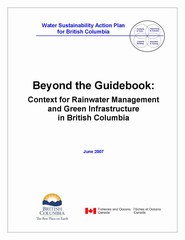Trans-Boundary Issues in Water Resource Management
The American Water Resources Association (Washington State Branch) and the Canadian Water Resources Association (B.C. Branch) are co-hosting a 2-day conference in Seattle, Washington on October 4-5, 2007.
The conference will feature a host of invited speakers from both Washington and British Columbia who will provide assessments of water-related research, management and policy in both jurisdictions.
The conference will explore approaches to managing stormwater/ rainwater and liquid waste, adjusting to the reality of climate change and addressing important transboundary topics of interest like those in the Columbia River Basin. There will also be political context from key decision-makers and substantial opportunity for dialogue through our interactive panel sessions.
The target audience for the conference is comprised of scientists, managers, engineers and policy-makers in Washington and British Columbia. The conference promises to be informative, relevant and well-attended by professionals in the water resource industry throughout Washington and British Columbia.
For more information, including registration, please click here.to access the conference website. For a program overview, please click on this link to Transboundary Water Resources of Washington State and British Columbia.
Stormwater Management and Low Impact Development
The conference is structured as six sessions, with four on Day One and two on Day Two. The format for each session is three presentations followed by a panel discussion.
 The session on Stormwater Management and Low Impact Development will feature a presentation about Beyond the Guidebook: Context for Rainwater Management and Green Infrastructure in British Columbia.This is a co-presentation by Kim Stephens (Program Coordinator, Water Sustainability Action Plan for British Columbia) and Remi Dube (Drainage Planning Manager, City of Surrey).
The session on Stormwater Management and Low Impact Development will feature a presentation about Beyond the Guidebook: Context for Rainwater Management and Green Infrastructure in British Columbia.This is a co-presentation by Kim Stephens (Program Coordinator, Water Sustainability Action Plan for British Columbia) and Remi Dube (Drainage Planning Manager, City of Surrey).
The Puget Sound is the second largest estuary in the United States and Canada. Water quality problems and the steady decline in aquatic and marine species, particularly salmon, in the sound continue to affect the quality of life and valued ecosystem components. The Region implemented some of the earliest stormwater quality treatment requirements.
- What has been the effect on water quality from increasingly stringent stormwater / rainwater management requirements that have been evolving for over 20 years?
- How will we meet the needs of an expanding population and development pressures around the sound?
- And how are similar pressures being addressed in British Columbia as they work to protect their receiving water quality?
This session will explore the similarities and contrasts in the approaches to stormwater / rainwater control taken on both sides of the border.
Posted July 2007

